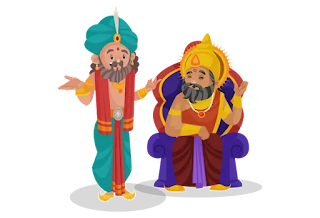Mahabharata - AAA(An Alternate Angle)
As we journey through the maze of life, our perceptions of right and wrong undergo a subtle transformation. Rather than painting actions with a broad brush of black or white, we begin to acknowledge the nuanced shades that infiltrate our moral compass. Now, let's delve into the epic saga of Mahabharata. Pandavas embodying virtue, and Kauravas draped in the garb of evil—seems clear-cut, doesn't it?
However, consider these thought-provoking twists:
- Picture the Pandavas in the forest after their home was reduced to ashes. Hidimba, a Raksha lady, extends a helping hand, but they shy away from matrimony. Did they spurn her because she was a Raksha, or didn't have wealth to offer as dowry? Yet, they readily marry Draupadi. Was it for love, or perhaps motives entangled in wealth, power, and ego?
- Their return to the Kauravas after claiming their share brings them Khandavprastha. From orphans to refugees and now owners, they set the forest ablaze. An odd way of thanking the haven that sheltered and sustained them—burning it to the ground. A peculiar form of gratitude, isn't it?
- Losing their palace in a game of chance, they paint themselves as victims. But who's the real victim? Yudhishthira, after losing, bets everything again. If Duryodhana is condemned for insulting Draupadi, shouldn't Yudhishthira face scrutiny for gambling away his family due to ego?
- Eklavya sacrifices his thumb to ensure Arjuna's archery dominance. Did the guardians of dharma remain silent? Did envy eclipse their sense of justice, witnessing the best archer in the land stripped of his essential tool?
- Karna, a warrior equal to Arjuna, is duped into donating his invincible armor and earrings. Was his generosity manipulated, leading to his demise? Did he deserve death as a reward for his benevolence?
- Bhisma was coerced into surrendering using Shikhandi, a heartbreaking deception. Telling a father that his son perished when he was alive—doesn't that pierce your heart? Ashwatthama's supposed demise, yet the greatest keeper of truth isn't confirmed. Can a father be trusted with such uncertainty?
No, I don't align with the Kauravas, nor do I excuse their atrocities. Yet, these questions beckon me to peer beyond the simplistic dichotomy of black and white, exploring the rich tapestry of grays that lie in between.


Comments
Post a Comment
Hey, let me know how you feel about this post here